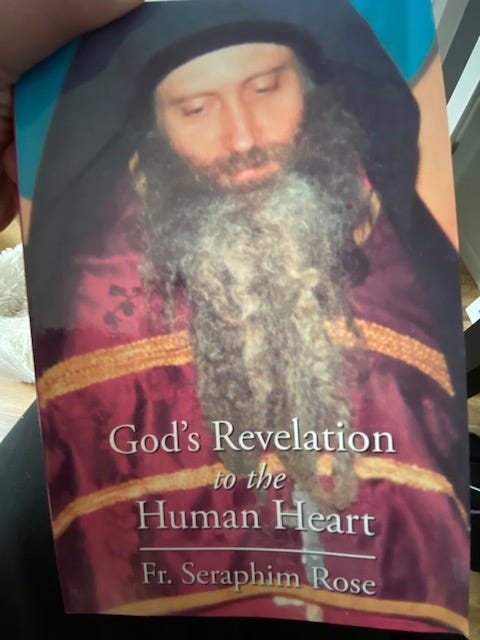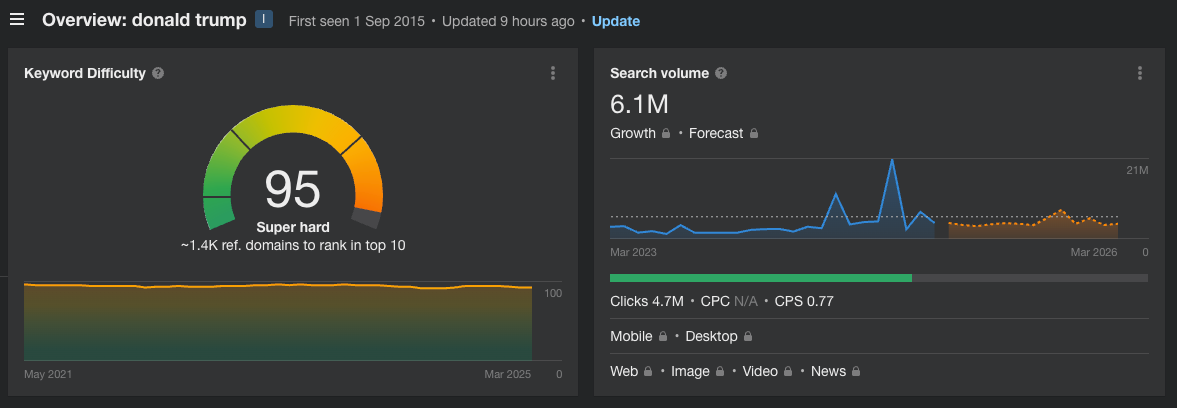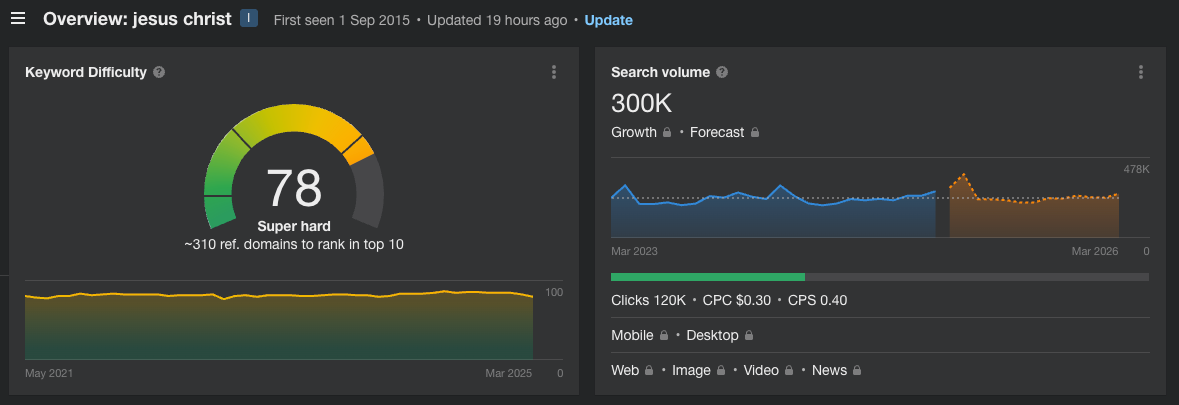Book Review: God's Revelation to the Human Heart
Fr. Seraphim Rose's Short But Impactful Speech About How God Reveals Himself
Fr. Seraphim Rose’s God’s Revelation to the Human Heart is probably one of his simpler works that packs quite a punch. You can read it in less than an hour and it will be time well spent as is the usual whenever reading Fr. Rose’s work.
The Spiritual Search
God’s Revelation to the Human Heart was a speech Fr. Rose gave to a Comparative Religion class at the University of California, Santa Cruz in the 1980s. We can only imagine what a Comparative Religion course in the ‘80s might teach and the type of people who would take it, but I’m willing to bet Fr. Rose wasn’t speaking to Orthodox Christians when he gave the talk.
And so he likely catered his talk to a varied audience which meant it had significant meaning without getting into the weeds. He stayed true to the Orthodox Faith but really kept the talk simple. In fact, if you are new to Christianity at all or if you are a spiritual seeker, you should probably read this work over any of his others (i.e, I’m still working through Nihilism…).
He starts the speech by asking,
Why does a person study religion? There are many incidental reasons, but there is only one reason if a person is really in earnest: in a word, it is to come into contact with reality, to find a reality deeper than the everyday reality that so quickly changes, rots away, leaves nothing behind and offers no lasting happiness to the human soul.
Fr. Rose is talking to a bunch of students here. All probably in their 20s. Young, naive, and probably lost, as all young somethings typically are lost. Again, they are taking Comparative Religion, perhaps for easy college credits or perhaps figure out the Truth of the world.
But as he prepared for this speech, he likely asked himself why did I study religion? His speech implies that was deeply unhappy before turning to Christ. How many of us, deeply unhappy, turn to religion? Nowadays - not many. At least, not any of the ancient, organized religions but rather the modern one of atheism and hedonism. Live it up! Yolo!
Without much evidence, other than cultural stories and themes, it seemed like before (i.e, before 2000s), at least some of people searched for God through the use of drugs. In 2025, people use drugs for the simple sake of getting high, ‘feeling good,’ or feeling nothing at all.
There isn’t even a religious component to drug use now with the exception of ayahuasca (but even that people aren’t taking to find Christ - also, stay away). But it all has the same effect as the man Fr. Rose mentions in the book, who was burnt out after a decade of doing LSD and following Gurus. The youth of today, after a decade of alcohol, cocaine, ecstasy, weed,
…[go on] their way, and before [they are] thirty years old [they are] a wreck of a [person], [their] minds ruined, and any search for reality abandoned.
Fr. Rose laments that the “search for reality is a dangerous task.” Except today, most people aren’t searching for Truth. They are searching google: for porn, political saviors, sports, endless Youtube, motivation, celebrity gossip, and so on. A brief look at google search will tell you what people care about:
Kim Kardashian Google Searches
Donald Trump Google Searches
Jesus Christ Google Searches
(It should be noted that if you are searching for the Lord on Google, you won’t find much depth. Instead go straight to the source: http://orthodoxinfo.com/ or https://www.fisheaters.com/.)
Indeed, the search for Truth is still dangerous but today its less ‘dangerous’ yet more sinister. You likely won’t get one-shotted by an Ayahuasca Demon but you may wake up in your thirties realizing you spent your 20s looking at a laptop or a cell phone or a TV and got absolutely nothing out of it, except for maybe more delusion, despair and unhappiness.
Revelation
If google search tells us anything, most people aren’t Christian meaning most anything you watch on Youtube, read on your cell phone or your TV have almost no basis in God, no basis in Truth, no basis in anything. It’s all Godless entertainment. Nothing more.
In 2025, the only way people will believe anything is if they see it with their own eyes. A subjective, spiritual ‘experience.’ They want ‘evidence’ for God because logical, philosophical reasoning is not enough (i.e., something can’t come from nothing doesn’t satiate them). It must be ‘concrete.’ What they want to see is actual proof of a miracle which is exactly what Fr. Rose says is not why someone should turn to Christianity.
The difference today is that these people I’m talking about are not spiritual searchers, they are cradle skeptics: they will not even open a Bible unless they have some sort of ‘proof’ that it’s worth it. Even if they did see ‘proof,’ it could be the work of a deceptive agent. Fr. Rose asks the question,
How can a religious seeker avoid the traps and deceptions which he encounters in his search? There is only one answer to this question: a person must be in the religious search not for the sake of religious experiences, which can deceive, but for the sake of truth.
But people today already ‘know’ the truth. They aren’t in the search and have discarded the religious search as worthless. Either that, or they are entirely distracted and couldn’t careless about the search in general. It’s not that it’s worthless or not, it’s that Mr. Beast is on YouTube or the Superbowl is on or it’s time to go party. They don’t even think about such things.
Of course, the book doesn’t just talk about ‘the search’ here. It talks about how God reveals himself to the heart. Fr. Rose tells the class about the story of the Apostle Phillip and the Ethiopian eunuch from the Book of Acts. Though this particular story is rife with miracles, Fr. Rose says “there was something else that effected [the eunuch]; not the miracles, but something in his heart.” The eunuch’s heart was “melted by the truth he heard.” Fr. Rose continues,
The words of Scripture are very powerful, and when the right interpretation is given to them, something in a human being “opens up” if his heart is ready.” Therefore the eunuch accepted Christ with his whole soul; he was a changed man. This was not for the sake of miracles, but for the sake of that which Christ came to earth to bring.
There’s more stories like this but if I were to repeat them all here, I’d almost write the entire book for you. Let’s move on to the next part about suffering.
Suffering
Fr. Rose spends a good part of his talk on suffering. He had met a young American who was trying to find Christ but had become disillusioned by the weak and fake Christianity of the time. The young man had come to know that Russian people were suffering because of their faith and so he sought to learn the Russian language so that he could go to Russia in order to find these suffering Christians. Why did he do that?
Because where there is suffering, he thought, there will probably be something real, and there will not be such fakery as we have in America.
It begs the question: what comes first? Belief in God, or suffering? Do you believe in God and suffer because of it or do you suffer, and therefore, believe in God, and suffer even more?
I’m asking because right now, I believe in God - in my heart, I have always believed but I have never suffered because of it like the Russians of the 20th Century or the Apostles or Christian martyrs that willingly got murdered by lions for Christ. I have never been threatened with death for believing in God. I’m not yet sure I would be strong enough to overcome that threat and therefore, perhaps, I am a faker. I pray not.
My life has been indulgent. I am a weak, lowly, wretched human. I have never truly suffered. Suffering, Fr. Rose argues, is the root of real faith, at the very least, “the idea of suffering might produce something genuine, while our indulgent life easily produces fakery.” He goes on to note that
almost all the Apostles died as martyrs, Peter being crucified upside down, and Andrew being crucified on an X-shaped cross. During the first three centuries of Christianity, believers fled to the catacombs and endured tremendous sufferings. It was in the catacombs that the Church’s Divine services - which we celebrate today in a form little changed since that time - were worked out in an atmosphere of constant expectation of death.
The Apostles and early Christians suffered because of their belief in Christ. And indeed, many people suffer, and then turn to Christ which causes them more suffering. Turning to Christ can end immediate suffering, provided that you suffer for Christ. Do you understand? The only way to escape your flamboyant, indulgent lifestyle which causes you great suffering is through real suffering. There is no Christianity without suffering.
One of the most prescient stories in the book is that of Yuri Mashkov. Mashkov was a young Russian man who had a bright Communist career ahead of him. Even though he was living in Communist Russia, some of what he said sounded like some of my own thoughts in Corporate America:
But the boring Soviet life and spiritual dissatisfaction gave me no peace, and somewhere at the end of 1955… there occurred an event, outwardly unnoticeable, which however overturned my life… This event occurred in my soul and consisted in the fact that I understood in what kind of society I was living.
There is no possible way I can compare the atrocities of Soviet Russia in the 50s to modern day Corporate America but still, how many of us have been sitting in a hollowed out office room feeling the same way, thinking is this it?
We work for thirty or forty years with the “hope” of retiring healthy enough to use our savings to then live. Most of us are slaves to debt: car payments, credit cards, mortgages, compulsive consumerism, where even if we didn’t want to work so much we’d have no choice but to keep doing so to pay the bills. I hate to complain so I’m not trying to do that here. But consumerism has its own dead end. Yet still, Yuri’s suffering was far worst than mine could ever be.
Yuri was reduced to a state of despair. He lost faith in what he had once believed through his training: that Communism is an idealistic teaching that brings happiness and peace.
Yuri had been sent to a concentration camp for seven years. He had his whole life ahead of him but as soon as he questioned the regime, he was reduced to a criminal. His only hopes were “[going] back to the camp, and remain there for the rest of [his] life, or [he] might die in a psychiatric prison, or [he] might be murdered by the secret police.” He had no way out. Yuri recognized himself as a dead man.
In these conditions of spiritual crisis, with no way out, there inevitably comes upon us the chief question of a worldview: what am I living for if there is no way out? And when this frightful moment comes, each of us feels that death has caught him by the throat: if some kind of spiritual answer does not come, life comes to an end, because without God not only is ‘everything permitted,’ but life itself has no value and no meaning.
There’s no atheists in foxholes and suffering helps the heart open up to God. Just know that in your lowest moments, you are that much closer to God. Your search for the Truth could end if you could only just soften your heart.
Conclusion
One of the best (or worst) part of the books is surely the Q&A at the end. The students in the classroom have potentially a future Orthodox Saint in front of them, something most of us would do anything to experience, especially Fr. Seraphim Rose, and the questions they ask him are mostly empty and hollow:
Would you speak about Orthodox attitude towards non-Christians?
So, people who haven’t had exposure to the Church don’t have access to the Truth?
What are the concrete differences between Roman Catholics and Orthodox Christians?
Can you talk about Anglicanism?
Two years later Fr. Seraphim passed away. I really enjoyed this short book - so much so that I finished it one reading. A lot of what Fr. Rose spoke about has come to pass and I look forward to finishing Nihilism after lent. He would be about ninety years old today. Though I’m not an Orthodox Christian, I don’t think I would even be Christian at all if not for the work of this man. RIP.
Smeagol








